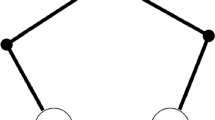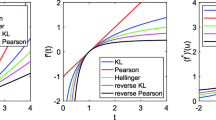Abstract
The bin packing problem consists of finding the minimum number of bins, of given capacity D, required to pack a set of objects, each having a certain weight. We consider the high-multiplicity version of the problem, in which there are only C different weight values. We show that when C=2 the problem can be solved in time O( log D). For the general case, we give an algorithm which provides a solution requiring at most C−2 bins more than the optimal solution, i.e., an algorithm that is asymptotically exact. For fixed C, the complexity of the algorithm is O(poly( log D)), where poly(·) is a polynomial function not depending on C.
Similar content being viewed by others
References
Althaus, E., Eisenbrand, F., Funke, S., Mehlhorn, K.: Point containment in the integer hull of a polyhedron. In: Proceedings of the 15th Annual ACM-SIAM Symposium on Discrete Algorithms (SODA-04), New Orleans, USA , 2004
Baum, S., Trotter, L.E. Jr.: Integer rounding for polymatroid and branching problems. SIAM J. Algebraic Discrete Methods 2 (4), 416–425 (1981)
Eisenbrand, F.: Fast integer programming in fixed dimension. Technical Report MPI–I– 2003–NWG2-002, Max-Planck-Institut für Informatik Saarbrücken, Germany, February 2003
Frank, A., Tardos, É.: An application of simultaneous diophantine approximation in combinatorial optimization. Combinatorica 7, 49–65 (1987)
Grötschel, M., Lovász, L., Schrijver, A.: Geometric algorithms and combinatorial optimization. Springer-Verlag, Berlin, Germany, 1988
Harvey, W.: Computing two-dimensional integer hulls. SIAM J. Comput. 28 (6), 2285–2299 (1999)
Hochbaum, D.S., Shamir, R.: Strongly polynomial algorithms for the high multiplicity scheduling problem. Oper. Res. 39, 648–653 (1991)
Isermann, H.: Ein Planungssystem zur Optimierung der Palettenbeladung mit kongruenten rechteckigen Versandgebinden. OR Spektrum 9, 235–249 (1987)
Kertzner, S.: The linear diophantine equation. Am. Math. Mon. 88, 200–203 (1981)
Leung, J.Y.-T.: On scheduling independent tasks with restricted execution times. Oper. Res. 30, 163–171 (1982)
Marcotte, O.: The cutting stock problem and integer rounding. Math. Program. 33, 82–92 (1985)
McCormick, S.T., Smallwood, S.R., Spieksma, F.C.R.: A polynomial algorithm for multiprocessor scheduling with two job lengths. Math. Oper. Res. 26, 31–49 (2001)
Nelißen, J.: New Approaches to the Pallet Loading Problem. Working Paper, RWTH Aachen, 1993. Available via anonymous ftp from ftp://ftp.informatik.rwth-aachen.de (137.226.225.3) as /pub/reports/others/pallet.ps.gz
Rietz, J., Scheithauer, G., Terno, J.: Families of non-IRUP instances of the one-dimensional cutting stock problem. Discrete Appl. Math. 121, 229–245 (2002)
Schrijver, A.: Theory of Linear and Integer Programming. Wiley-Interscience, Chichester, 1986
Author information
Authors and Affiliations
Corresponding author
Rights and permissions
About this article
Cite this article
Filippi, C., Agnetis, A. An asymptotically exact algorithm for the high-multiplicity bin packing problem. Math. Program. 104, 21–37 (2005). https://doi.org/10.1007/s10107-004-0567-y
Received:
Accepted:
Published:
Issue Date:
DOI: https://doi.org/10.1007/s10107-004-0567-y




